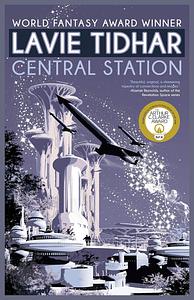Take a photo of a barcode or cover
Had a bit of a hard time getting into this one, but I enjoyed the vivid descriptions and the imaginative worlds created. "Life was half-completed plots abandoned..." As such, Central Station left quite a bit unanswered. A nice experience nonetheless.
While it doesn't necessarily work well as a novel, it was a really good set of connected short stories. The writing was lovely and really gave a sense of each character with just a few paragraphs. Interesting ideas about future Earth.
Central Station by Lavie Tidhar is a free NetGalley ebook that I read in early April.
Its prose is dazzlingly global, Shakespearian, and almost Blade Runner in nature.
Its prose is dazzlingly global, Shakespearian, and almost Blade Runner in nature.
Just didn’t enjoy this. I struggled to make sense of the story line.
challenging
inspiring
mysterious
reflective
medium-paced
Plot or Character Driven:
Character
Strong character development:
Yes
Loveable characters:
Yes
Diverse cast of characters:
Yes
Flaws of characters a main focus:
Complicated
Central Station is not a novel. I start with this, because it's important to how I had to understand the work. If you go into this book reading it as a novel, you will be frustrated. Seemingly significant details emerge, are studied, and then are dropped before they follow through to a satisfying conclusion.
Central Station is not a short story collection, though it started out that way. Most of the 'chapters' were originally published as separate works, forming the Central Station Story Cycle, but the versions published were--according to the copyright page--'substantively different' versions than those which appear in this volume.
And so what the reader experiences is more than a collection, less than a novel, and yet still somehow moving.
And so they don't. The story should feel unfinished--and it's true that I'm left wondering about many things--but that's okay. What's presented here is a patchwork of human (and I suppose, 'post-human') experience. From Boris Chong, to Kranki and Ismail, to Carmel, to the Robotniks--and oh my heart breaks for the Robotniks, there's a great deal here that I like.
There's also some commentary that I didn't connect with. Faith and religion of all creeds are ever-present in the background (We see Jews, Catholics, Buddhists, and others milling about this future Tel Aviv and Central Station), but the one that the reader hears most of is the Church of Robot, with the psychotropic drug called 'faith' or 'Crucifixion,' coupled with a mish-mash of terms from religions around the world coupled to new definitions. In another segment, add in Eliezar the god-maker, and the nature of the Others (and by extension the children) ...It's a great example of where a book and I have to nod and part ways.
It's unsurprising that Lavie Tidhar has drawn comparisons to Philip K. Dick, I definitely got that vibe from his style. But unlike PKD, I'm missing that final a-ha! moment where the crazy becomes clarity.
Ultimately, I enjoyed it. There's just enough tilt to the world to keep me intrigued. As a series of snapshots, loosely connected into a narrative of human experience, 4 stars without question. As any kind of novel in the traditional sense, 3.
Central Station is not a short story collection, though it started out that way. Most of the 'chapters' were originally published as separate works, forming the Central Station Story Cycle, but the versions published were--according to the copyright page--'substantively different' versions than those which appear in this volume.
And so what the reader experiences is more than a collection, less than a novel, and yet still somehow moving.
"There comes a time in a man's life when he realizes that stories are lies. Things do not end neatly."
-Lavie Tidhar, Central Station
And so they don't. The story should feel unfinished--and it's true that I'm left wondering about many things--but that's okay. What's presented here is a patchwork of human (and I suppose, 'post-human') experience. From Boris Chong, to Kranki and Ismail, to Carmel, to the Robotniks--and oh my heart breaks for the Robotniks, there's a great deal here that I like.
There's also some commentary that I didn't connect with. Faith and religion of all creeds are ever-present in the background (We see Jews, Catholics, Buddhists, and others milling about this future Tel Aviv and Central Station), but the one that the reader hears most of is the Church of Robot, with the psychotropic drug called 'faith' or 'Crucifixion,' coupled with a mish-mash of terms from religions around the world coupled to new definitions. In another segment, add in Eliezar the god-maker, and the nature of the Others (and by extension the children) ...It's a great example of where a book and I have to nod and part ways.
It's unsurprising that Lavie Tidhar has drawn comparisons to Philip K. Dick, I definitely got that vibe from his style. But unlike PKD, I'm missing that final a-ha! moment where the crazy becomes clarity.
Ultimately, I enjoyed it. There's just enough tilt to the world to keep me intrigued. As a series of snapshots, loosely connected into a narrative of human experience, 4 stars without question. As any kind of novel in the traditional sense, 3.
emotional
inspiring
mysterious
slow-paced
Plot or Character Driven:
Character
Strong character development:
Yes
Loveable characters:
Yes
Diverse cast of characters:
Yes
Flaws of characters a main focus:
Yes
Admiration for Lavie Tidhar's creative vision of a science fiction future. A number of diverse characters dwell in this city with roots to mysteries of the past and a giant link to their present-future - that being the port of Central Station. Appreciation for how Mr. Tidhar shows us the many details which link past and future in his tale. Lavie steps lightly across space, into virtuality, and back to the side street markets and connects them all in a manner which makes his city, characters and story real to me because of his vivid descriptions.






